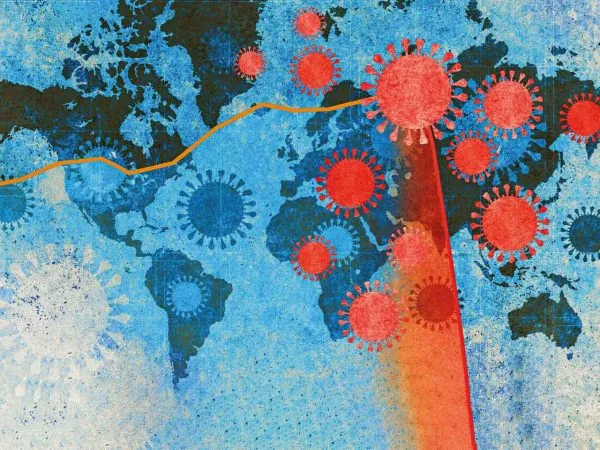
The Looming Threat of Disease X: Why We Must Take Pandemic Preparedness Seriously Now
2025-01-23
Author: Ming
The world stands on the brink of a potential pandemic known as Disease X—a term originally coined by the World Health Organization (WHO) back in 2018 to denote unknown infectious pathogens capable of sparking a global health crisis. Although it may sound like a plot from a blockbuster movie, experts agree that it is not a question of "if," but "when" we will confront such a threat.
The reality is that recent history, particularly the COVID-19 crisis, showcases just how devastating a widespread infectious disease can be. There are alarming projections that future pandemics could claim lives at rates potentially 20 times higher than COVID-19. Key factors—ranging from climate change to increased human-animal interactions—elevate our risk of emerging pathogens.
WHO Director-General Tedros Adhanom Ghebreyesus aptly described the need for preparedness at the recent World Economic Forum in Davos, stating, “Failing to prepare leaves the world prepared to fail.” Experts assert that there is a staggering 25% chance of another outbreak akin to COVID-19 in the next decade. With frequent global travel and urbanization, the stage is set for a potential Disease X scenario that could wreak havoc on health systems and the economy.
Pandemics Past: The Costly Lessons of History
Historically, pandemics have caused significant loss of life and economic turmoil. The Spanish Flu of 1918-1920 infected a third of the world's population and resulted in millions of deaths, eclipsing the impact of both World Wars combined. Similarly, the HIV epidemic has claimed approximately 40 million lives since it was identified in the 1980s. Recent outbreaks, like the resurgence of influenza A H5N1 and monkeypox, underscore the persistent threat of infectious diseases.
In the current landscape, public health experts warn that underestimating these threats could lead to catastrophic consequences. As seen with COVID-19, even minor outbreaks can lead to global economic shutdowns. For instance, lockdown measures during the pandemic resulted in trillions of dollars in economic losses worldwide.
Economic Fallout: The Price of Unpreparedness
The economic ramifications of pandemics have proven to be as chilling as the death toll. COVID-19 caused extreme disruptions: over 1.1 million deaths in the U.S. alone, with estimates of $3.7 trillion in economic losses resulting from widespread job losses and business closures. The International Monetary Fund (IMF) forecasts that the cumulative economic loss from 2020-2024 could exceed $13.8 trillion, with nations, especially developing ones, taking years to recover.
While wealthy nations have demonstrated remarkable economic resilience and recovery through significant stimulus measures, poorer countries have struggled to keep their economies afloat. The notification from the Africa CDC highlights the ongoing challenges in combating emerging diseases like monkeypox due to inadequate funding and resource allocation.
The Call to Action: Preparing for Disease X
With the inevitability of future pandemics, the call for widespread investment in pandemic preparedness and response (PPR) has never been more urgent. Experts estimate that low and middle-income countries require a combined annual investment of $31.1 billion in PPR, a budget that seems daunting but is crucial for preventing future crises.
The recent experience highlights the importance of early detection, improved public health infrastructure, and rapid vaccine development. Organizations like the Coalition for Epidemic Preparedness Innovations (CEPI) are working toward ambitious goals, such as producing effective vaccines within 100 days of identifying new outbreaks.
As we look forward, global leaders must prioritize building robust health systems capable of responding swiftly to infectious disease threats. The experience from COVID-19 taught us that investment in health security can save millions of lives and mitigate extensive economic damage.
The time to act is now. Without immediate and decisive action, the world risks facing a future where the next pandemic—or Disease X—could have even more catastrophic consequences. Let's not wait to learn another painful lesson; preparedness must become our priority before it is too late.

 Brasil (PT)
Brasil (PT)
 Canada (EN)
Canada (EN)
 Chile (ES)
Chile (ES)
 Česko (CS)
Česko (CS)
 대한민국 (KO)
대한민국 (KO)
 España (ES)
España (ES)
 France (FR)
France (FR)
 Hong Kong (EN)
Hong Kong (EN)
 Italia (IT)
Italia (IT)
 日本 (JA)
日本 (JA)
 Magyarország (HU)
Magyarország (HU)
 Norge (NO)
Norge (NO)
 Polska (PL)
Polska (PL)
 Schweiz (DE)
Schweiz (DE)
 Singapore (EN)
Singapore (EN)
 Sverige (SV)
Sverige (SV)
 Suomi (FI)
Suomi (FI)
 Türkiye (TR)
Türkiye (TR)
 الإمارات العربية المتحدة (AR)
الإمارات العربية المتحدة (AR)